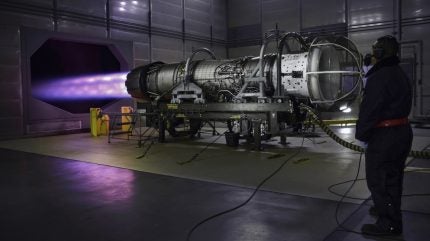
GE Aerospace has secured an indefinite delivery/indefinite quantity contract with the US Air Force (USAF), valued at up to $5bn, for the supply of F110-GE-129 engines.
The contract includes a five-year pricing agreement for the installation and spare engines of the F110-129 model, along with new engine monitoring system computers and spare engine accessories.

Discover B2B Marketing That Performs
Combine business intelligence and editorial excellence to reach engaged professionals across 36 leading media platforms.
The agreement pertains to a foreign military sale (FMS) that will provide the Royal Saudi Air Force with services.
Additionally, this contract extends to cover the needs of the Royal Jordanian Air Force, Bulgaria, alongside any other entities bound by existing letters of offer and acceptance that specify General Electric as the exclusive supplier for F110 engines.
The contract was awarded through a sole-source procurement process. At the time of the award, FMS case funds totalling $41.73m have been committed to finance this agreement.
Work under this contract will be carried out in Cincinnati, Ohio, and San Antonio, Texas, with an expected completion date of 31 December 2030.

US Tariffs are shifting - will you react or anticipate?
Don’t let policy changes catch you off guard. Stay proactive with real-time data and expert analysis.
By GlobalDataGE Aerospace Defense & Systems president and CEO Amy Gowder said: “We are honoured to reach this agreement with the US Air Force, ensuring the F110-GE-129 remains the engine of choice for the world’s F-15 and F-16 fleets.
“This contract underscores the enduring trust in the F110’s performance, reliability, and value for our customers and their critical missions.”
These engines power the F-15 and F-16 aircraft operated by US allies around the world.
The contract underlines GE Aerospace’s role in ensuring that F-15 and F-16 fleets remain mission-ready internationally.
The F-15 Eagle is an all-weather, extremely manoeuvrable, tactical fighter and the F-16 Fighting Falcon is a compact, multi-role fighter aircraft.
The F110 engine has more than 11 million flight hours and recently marked 40 years of continuous production and enhancement.
It incorporates technology upgrades, such as service life extension programme hardware and a 6,000 total accumulated cycle capability, which aim to improve engine availability and reduce life-cycle costs.



